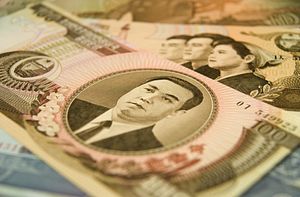Transparency International recently released its annual Corruption Perceptions Index. Not surprisingly, North Korea ranked in last place again, alongside Somalia. What this figure betrays, however, is a different sort of progress, one that has been taking place behind the scenes in North Korea.
In Asia, there is a saying that “The real profits are in government.” This is a reference not to generous public sector salaries, but rather to kickbacks, bribes, and graft. That is certainly the case in North Korea, where gift politics have greased the wheels of industry since the country’s foundation. On face value, corruption might be considered a purely negative force. And it’s true that corruption remains pervasive in North Korea. Indeed, it seems to be growing in scale, frequency and distribution. However, the spread of corruption at the bottom rungs of North Korean society has had a peculiarly egalitarian effect.
With the emergence of the grassroots market in North Korea, an important structural and ideological shift has occurred. While the country has remained at the bottom of the Corruption Perceptions Index for nearly two decades, ideological changes inspired by the growing power of the private sector have made it easier for ordinary people to use bribes to make a living without being harassed by the Ministry of Peoples’ Security. An estimated 90 percent of North Koreans are tied to the market in some way, according to the Northeast Asia Peace and Cooperation Institute. To understand a bit more, it is helpful to look at cases outside North Korea.
The government of Singapore maintains comparatively high salaries for its officials in order to prevent the likelihood of bribery. The salary of Singaporean ministers has been pegged to two-thirds the median salaries of the country’s lawyers, bankers, engineers, and accountants. But high salaries aren’t necessarily a guarantor of pristine government. Kenya pays its members of parliament $13,000 per month, but regularly gets ranked near the bottom of the Corruption Perceptions Index. To solve this problem, Singapore also has an aggressive Corrupt Practices Investigation Bureau. Thanks to this healthy mix of carrots and sticks, Singapore has scored in the top 10 percent of the Corruption Perception Index for over a decade.
Unlike Singapore, North Korean officials are paid very small salaries. In fact, cadres are pressured to earn foreign currency to such an extent that the heavy use of bribes and graft is almost inevitable. Of course, unchecked corruption causes dysfunction, waste, inefficiency and, ultimately, disaster. I have argued, for example, that endemic corruption is counterproductive to economic growth and political management in North Korea in the macro sense. However, it might be reasonably contended that there is an egalitarian element to the way that bribery increases upward mobility for those with poor songbun (caste based on pedigree and regime loyalty) and helps ordinary people avoid the gulags. That’s because, after the spectacular failure of government institutions in the mid 1990s, the cadres have increasingly turned to the private market for investors, labor, and expertise.
The increased role of bribery in North Korean daily life has thus helped to facilitate important social trends. The opening of the floodgates to outside information is one such example. Twenty-seven percent of North Korean respondents have listened to foreign radio broadcasts, according to a 2010 survey by Intermedia for the U.S. Department of State. Nineteen percent got most of their news from pirate radio, according to a 2004 survey of defectors. Although the risks of tuning in are still high, the State Department report also indicates that fewer North Koreans are willing to report on each other for consuming the contraband material. If caught, many are able to bribe the arresting agent. After getting caught with foreign media, one man paid three bundles of ten cigarette packs and was left alone, for example.
Without a functioning public distribution system, people receive few tangible benefits from the regime. They have come to understand that bribery is the only way to compel officials and agents to do their jobs. This has eroded the paternal image of the Kim dynasty and cut away at the efficacy of Kim Jong-un’s attempts to foster and stimulate adoration.
Bribery is essential for opening up economic opportunities to those who are normally cut off by the political elite’s stranglehold on the more profitable industries. Companies earning foreign currency sometimes sell their trading permits to donju (new moneyed class) investors in return for bribes and a 30 percent stake in the profits. One group of donju regularly bribe military officials $100 a day in order to take home 30 percent of the profits selling 50 tons of seafood annually to the military base at the North Pyongan artillery command. Of course, this money goes to the regime, which is so cash strapped and starved for foreign currency that it is relinquishing its death grip on the markets.
The ultimate question is whether the profit gained by the regime through taxing and soliciting bribes from the donju is less significant than the territory its ceded in crucial industries and ideology. I suspect it isn’t. That’s why we should reconsider the social role of bribery in North Korea, and think again about what its ranking on the Corruption Perceptions Index really means.
Jonathan Corrado is an MA candidate in Georgetown’s School of Foreign Service Asian Studies Program. He also works as a reporter and translator for the Daily NK and as a due diligence investigator for an international compliance firm.

































